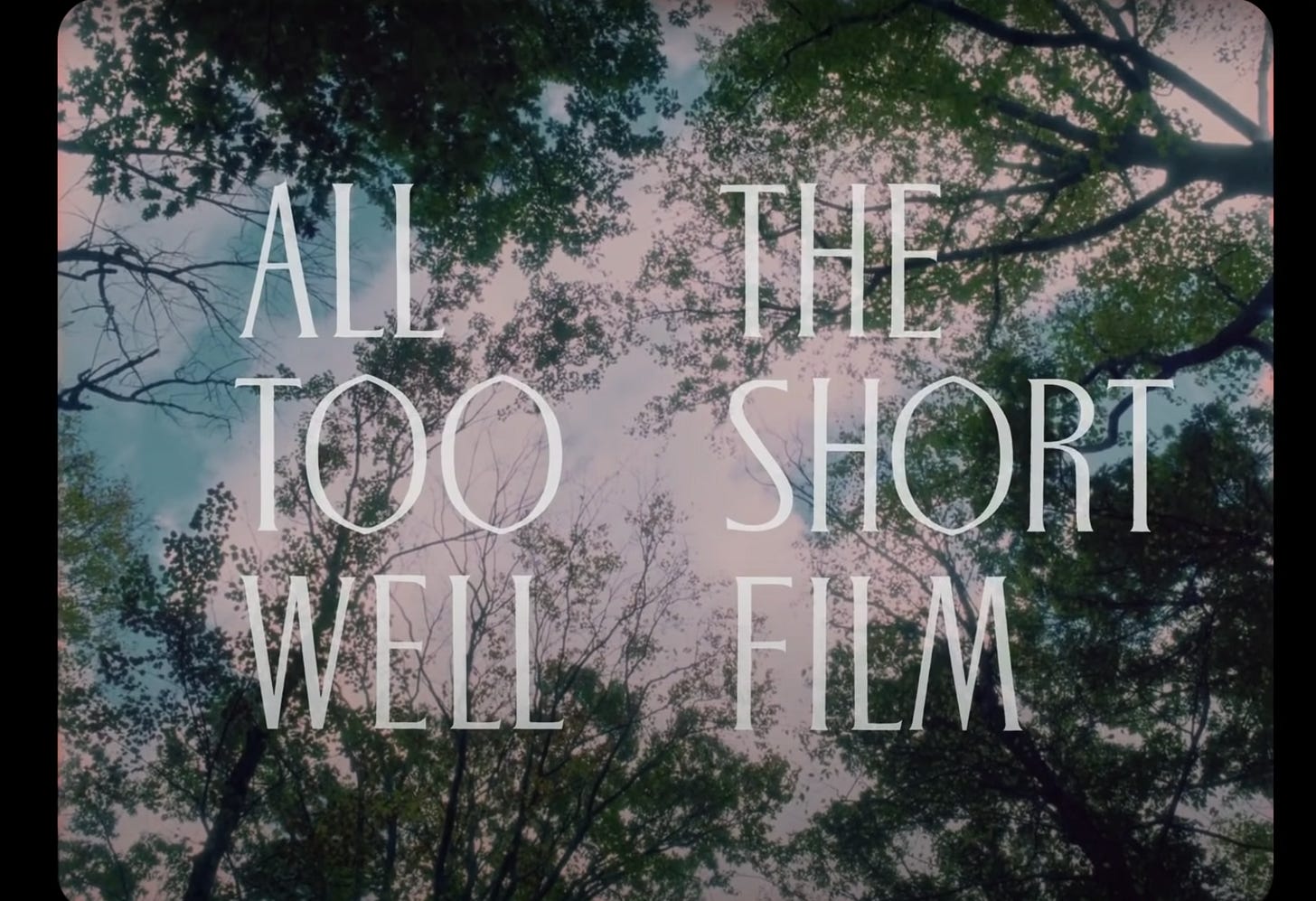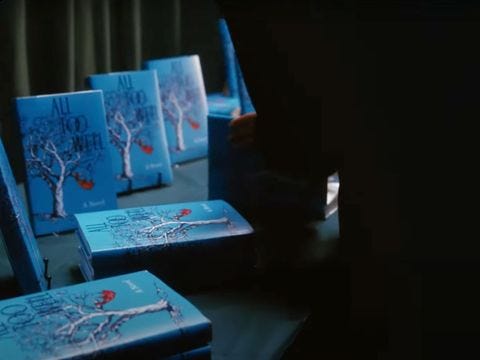Taylor Swift’s recent re-release of Red included a 10-minute version of the beloved fan-favorite song “All Too Well”. Never one to be unproductive, Taylor also released her foray into filmmaking, serving as the writer and director of All Too Well: The Short Film starring Sadie Sink as her younger self and Dylan O’Brien as… well, if you know, you know.
All Too Well: The Short Film looks exactly how you expect it to look. There are title cards in pleasantly Pinterest font. The fall vibes are off the charts. It’s shot in a 1.33:1 aspect ratio, so all the imagery is contained within the rounded square of an old photo strip. Sadie Sink and Dylan O’Brien do their best to look like normal, grounded human beings in cozy knits and flannels, while still remaining utterly unattainable.
Narratively, the film follows the song’s lyrics, hitting all the beats of a breakup song like a drum.
Sadie Sink wrapping a red scarf around a banister? Check! (And I left my scarf there at your sister's house / And you've still got it in your drawer even now)
Sadie Sink and Dylan O’Brien fighting in the kitchen, dropping swear words that would’ve made the Taylor of Speak Now gasp? Check! (And maybe we got lost in translation / Maybe I asked for too much / But maybe this thing was a masterpiece 'til you tore it all up)
An older, wiser Taylor Swift soaking up the success while Dylan O’Brien looks forlornly on? Check! ('Cause there we are again when I loved you so / Back before you lost the one real thing you've ever known)
Is it indulgent? Yes. Cliché? Of course. Brilliant? Undoubtedly. Red is famously an album of transition for Swift. In sound, this album introduces electronic beats, a departure from the simple guitar of her earlier albums. Lyrically, Swift moves away from the more straightforward emotions of her first three albums to the messiness of Red.
This album is all about narrativizing— making a story out of the confusing pieces of life. Swift has always been famous as a storyteller, but this is the first time she’s more self-aware about that narrative, commenting on it in a way that would only grow with 1989 and Reputation.
Compare the more straightforward lyrics of Speak Now to the lyrics of Red.
“You are not the kind of boy / Who should be marrying the wrong girl” (Speak Now from Speak Now)
“You made a rebel of a careless man’s careful daughter / You are the best thing that’s ever been mine” (Mine from Speak Now)
“You said if we had been closer in age maybe it would have been fine / And that made me want to die / The idea you had of me, who was she?” (All Too Well from Red)
“It seems like one of those nights / This place is too crowded / Too many cool kids / Who’s Taylor Swift anyway? Ew (22 from Red)
Speak Now still clings to the fairy-tale simplicity of Swift’s earliest lyricism. She doesn’t shun adversity, but there tends to be an uncomplicated morality to the worlds she builds in her songs, where those who are kind win in the end, where love triumphs over the pressures it faces, and where emotions are clean even if they’re not easy. Swift never fully abandons that moral system, but it’s far more complicated in Red.
“The idea you had of me, who was she?” is a line that packs a punch that her earlier lyrics rarely do— it’s an acknowledgement that the relationship she thought was one thing was something else entirely, and that it’s possible for two people to exist together while experiencing two completely different narratives. This realization is what “makes [her] want to die”. Red also introduces more awareness of Swift’s place in the culture as a talented artist, but one who’s always too mainstream, too corny, too this, or too that. The sarcastic “Who’s Taylor Swift anyway? Ew” is one of the early seeds that blooms into Reputation, an album that ruminates on Swift’s rollercoaster ride with the media.
Taylor Swift released Red when she was only 22, which means it’s Taylor Swift’s musical foray into adulthood. This is an album that rejects the fairy-tale sensibilities of her earlier albums but still romanticizes the heartbreak that accompanies that rejection. It’s an album that reaches consistently for maturity, while remaining at heart, an album by a twenty-something for twenty-somethings.
This is well illustrated by the ending of All Too Well: The Short Film, in which a fictional Taylor, now older and played by herself, has just debuted a successful novel (titled, of course, All Too Well). She reads an excerpt of it to a rapt (mostly female) audience, and the camera moves outside to show Dylan O’Brien somehow radiating regret despite not facing the camera.
The instinct to pan this ending is strong. It’s shot like a daydream or fantasy sequence, and it feels a bit like gloating. Mostly, it smacks of absurdity. But it’s worth resisting the instinct to take cheap shots, because this ending is faithful to Red as an album. The fantasy of showing an ex what they’re missing by becoming undeniably, wildly successful is so cliché, it’s almost juvenile, but ultimately, this is a 31-year-old woman returning to songs she wrote in her early twenties (and financially/legally reclaiming those songs from a position of power).
If you think Swift isn’t thinking about what it means to return to her Red era after a decade, then you haven’t been paying attention. Swift could have made All Too Well: The Short Film cooler, more sophisticated, more mature, but instead she made a film that only reinforced what Red was all about in the first place: being romantic while trying to seem cynical, being young while trying to seem older, being one thing and becoming another. This is an older Taylor Swift understanding that what the canon considers “good” or “bad” isn’t nearly as important as what her fans consider real, and this is an affirmation of their right to narrativize their youth the way they want to, no matter how it comes off to others.
The first time Red was released in 2012, I wasn’t a big Taylor Swift fan. It just so happens that almost a decade later, Red (Taylor’s Version) is reaching me when I’m only slightly older than Swift was when she wrote the album. It strikes me that regardless of whatever success or wisdom Taylor Swift might have gained in the intervening nine years, she’s re-releasing Red by sincerely embracing how embarrassing, absurd, and wonderful it is to be in your twenties. At this point, Red is both older and, in a way, younger than me— which really just means that, like most of what Taylor Swift does, it’s timeless.
Thanks for reading this special issue! If you enjoy this content, please consider subscribing (it’s free)!





